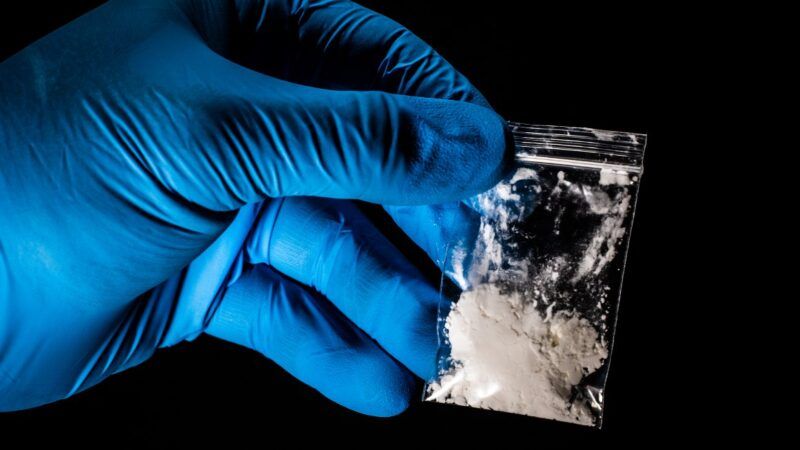West Virginia Mulls New Criminal Penalties for Imaginary Threat of Police Fentanyl Exposure
A medical myth that responders can overdose by touching or inhaling synthetic opioids may lead to harsher jail sentences.

West Virginia lawmakers are poised to create two new criminal penalties for exposing cops and first responders to contact with fentanyl, a danger that has been largely exaggerated and does not actually exist.
On Monday, West Virginia's state House, by a vote of 94–2, passed H.B. 2184 and sent it to the state's senators for review. The bill creates a new misdemeanor crime for anybody who possesses fentanyl and exposes a government official, health care worker, police or correctional officer, utility worker, or emergency responder to it. The penalty for exposing these workers to fentanyl is a maximum fine of $500 and up to one year in jail.
If any of these government employees are harmed by this fentanyl exposure, then the crime becomes a felony, with a fine of up to $2,000 and a two- to five-year prison sentence.
But police officers and emergency responders are not at risk of an overdose by touching or inhaling fentanyl. That physical contact alone can lead to overdose is a chronic myth sometimes spread by law enforcement agencies and uncritically passed along by media outlets. Last summer, San Diego County Sheriff's Department released a video purporting to show a deputy collapsing from an overdose after exposure to fentanyl. Media outlets uncritically passed along these claims and then after-the-fact turned to experts in opioids to explain that it is very unlikely the deputy overdosed based on this form of exposure. The video remains on YouTube despite being widely discredited by experts.
Remarkably, MetroNews in West Virginia, in covering H.B. 2184, does not mention that police and emergency personnel are not at danger of overdose from fentanyl exposure. The story quotes the bill's sponsor, Delegate Larry Pack (R–Kanawha) as saying "we're being overrun by fentanyl in our state. They are mixing it with a lot of different drugs and it really does expose our first responders to illness and even death." No experts are consulted to puncture this myth or suggest this claim is untrue.
The story does quote one of the only delegates to vote against the bill, Mike Pushkin (D–Kanawha), who noted that the bill won't actually help deal with any real problems of opioid overdoses. He adds that it will be difficult to actually convict anybody of the law because it requires "intentional" possession of fentanyl and the reality is that many of these opioid overdoses happen because fentanyl is added to a synthetic street drug without the user's knowledge.
Pushkin also noted to Filter (which, unlike MetroNews, explains that the risk of exposure isn't real) that the law's wording doesn't even explain what "exposure" even is: "Does it mean they're in the same room? Does it mean they do a search and they find it?"
The bill has already failed once and may not pass in the Senate. But it has also picked up votes since it was left stuck in the Judiciary Committee in the state Senate last year. Last time, 11 delegates voted against it. On Monday, just two voted no.
If the bill becomes law, it will be reminiscent of harsher crack cocaine sentencing laws passed in the 1980s out of the scientifically unjustified fears that crack cocaine was more dangerous and addictive than powder cocaine. These fears turned out to be untrue, but we're still unwinding the harsh sentences that resulted. We'd be wise to not repeat these same mistakes when dealing with secondhand fentanyl exposure.
Editor's Note: As of February 29, 2024, commenting privileges on reason.com posts are limited to Reason Plus subscribers. Past commenters are grandfathered in for a temporary period. Subscribe here to preserve your ability to comment. Your Reason Plus subscription also gives you an ad-free version of reason.com, along with full access to the digital edition and archives of Reason magazine. We request that comments be civil and on-topic. We do not moderate or assume any responsibility for comments, which are owned by the readers who post them. Comments do not represent the views of reason.com or Reason Foundation. We reserve the right to delete any comment and ban commenters for any reason at any time. Comments may only be edited within 5 minutes of posting. Report abuses.
Please to post comments


… it will be reminiscent of harsher crack cocaine sentencing laws passed in the 1980s
Fuck Joe Biden
Earn income while simply working online. work from home whenever you want. just for maximum 5 hours a day you can make more than $600 per day online. (er02) From this i made $18000 last month in my spare time.
.
Check info here:- ==>> http://moneystar33.blogspot.com/
Yeah, Shackford completely neglects to mention who spearheaded those laws at the federal level. Do you suppose that chemjeff will call him out for his lies of omission?
law is stupid but I *did* see on Body Cam a cop go lights-out while transporting an arrestee to the jail. crashed his cruiser and was unconscious. the chick in the cuffs was freaked.
I mean, it's not inconceivable that a cop could accidentally ingest enough fentanyl to cause some problems. But unless someone is deliberately trying to poison them, seems like the cops' problem. They know the job potentially exposes them to potent drugs.
Better idea. Let's get rid of these laws so that police aren't sent to arrest people for using, holding or selling these drugs.
Jesus. Just let them have their oxy. At least then it's clear what you're dealing with. If users want to be dumb (or suicidal) and OD, that's their problem.
It's like Medusa. Just looking at fentanyl turns you to stone.